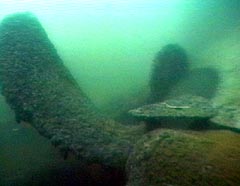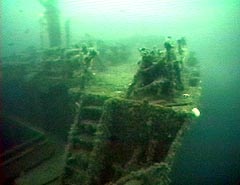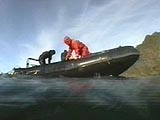Wreck Diving in Norway
During an expedition to Norway we
were diving on several shipwrecks along the coastline of
Norway in the south and far above the polar circle. Most
exciting wrecks are from the World War II battles. Text
by Jerome Konen,
video by Harry Jahnsson
Video edit and still images by
Jerome Konen
(Trip from 10 August - 1 September 1996)
After some nice drinks in the local pub, following our
weekly training sessions in the pool, Paul, Marc and myself we
decided to go that summer together to Norway for a diving
expedition, especially on the World War II shipwrecks. This
should definitely be getting a real adventure.
"M/S Seattle" 
Arrived in Kristiansand, we decided to do immediately a
first dive on the popular and very impressive German cargo
shipwreck, the "M/S Seattle", sunken in 1940 after
being ablaze for 3 days before hitting the rocks. All
crewmembers were able to escape during the disaster from the
ship.
The vessel lies at a depth of 23-70m and has a length of
145m. A dive shop in Kristiansand arranged the trip to the
wreck. The dive was very interesting with plenty to look at,
but would need much more descends to explore it in details,
especially the bridge.
Unfortunately, Marc lost his 20mm underwater lens of his
camera at the stern, near the propeller at more than 40m
depth. Three weeks after, by doing our last dive again on this
wreck before driving back home, we made the mission impossible
real and found the lens back on the ground near the wreck at
42m depth and fully functional.
Steamship "Ramø" 
The most exciting places for diving in Norway are
definitely the Lofoten Islands 100-250km above the polar
circle. The Islands cover an area of about 1200km2 and nature
being of the most spectacular appearance. In addition to
wonderful nature dives, a lot of shipwrecks are in the
immediate area and rather easy to dive.
So, Magne Goffeng from the "Lofotdyk Dive Centre"
took us first to the wreck of a steamship called "Ramø",
sunken in 1946. The length is about 100m but the wreck is
rather destroyed. The highlights are the huge steam boiler and
the big propeller behind the rudder.
"M/S Hamburg" 
The harbour of Svolvaer, main town on the Lofoten Islands
has a great surprise to offer to wreck divers. A huge German
cargo vessel lies 90° at the starboard side on the ground
in 25m depth.
This highlight is accessible in all weather conditions due
to the position inside the harbour of the wreck. The "Lofotdyk
Dive Centre" offers even night dives on this wreck, which
are unique in sensation and experience but require very strong
briefings and orientation sense as in the dark it is sometimes
not possible to distinguish the outside from the inside of the
wreck. Powerful lamps are a must.
Impressive in every details are the anchor capstan and the
oversized chain while diving along the deck. The wreck is much
more destroyed at the back but passing into the very huge
cargo spaces inside with a powerful lamp is quite impressive
and gives some ideas about the size of this sunken vessel.
"M/S Rabat"
Back on the main land on the Norwegian coast we visited Bodø
for another wreck highlight we heard about. In the Dive Centre
in town we arrange a trip to this spectacular wreck "M/S
Rabat", together with the 4 Finnish divers we met and
dived together the days before on the Islands. 
This wreck dive turned out to be one of the best we ever did
in the past. The German vessel has been build in 1929, has a
length of 86m and lies perfectly upright on deep 40m ground in
the harbour of Bodø.
The ship was sink by an English aircraft bomb the 4 October
1943.
The whole wreck is worth a visit especially diving along the
deck among plenty of fishes crossing in front of you. Diving
under deck and inside the cabins is exciting but you should
always have an eye on your bottom time, as the dive is quite
deep and decompression stops obligatory. Foreseen several
dives for exploring this wreck in details.
Although the calm situation of the harbour area, diving on
this wreck should only be done by experienced divers with
decompression practice.
Conclusion

Wreck diving is one of the most exciting, thrilling and
spectacular experiences in scuba diving and most of these
wrecks along the Norwegian coast are somewhat more interesting
due to their involvement in the World War II battles. Due to
some difficulties by either the depth the visibility or the
size of the wreck, some strong previous experience is
required. I also recommend strongly to use and take your own
diving equipment with you, especially drysuits, cold water
regulators and powerful lamps on such an expedition.
If you are looking for a real adventure and good wreck
diving, Norway is definitely worth more than a recommendation. |